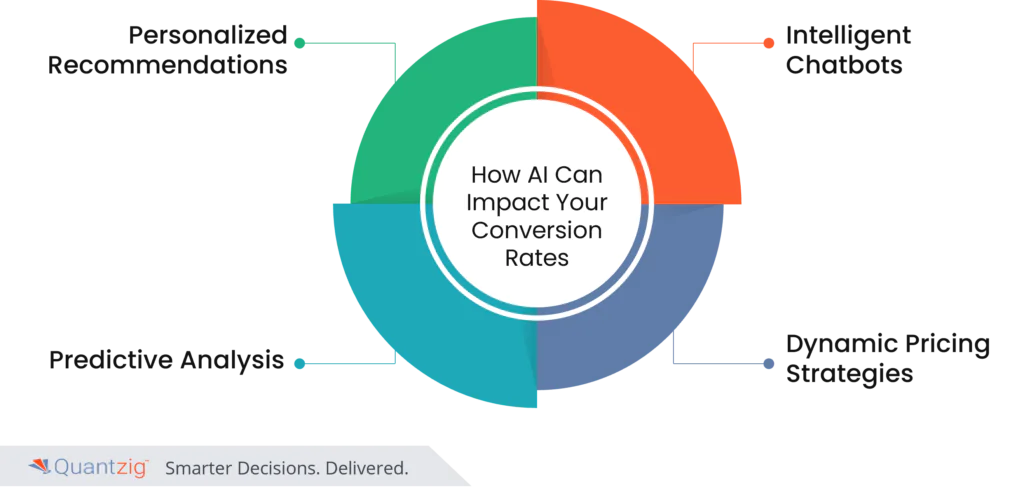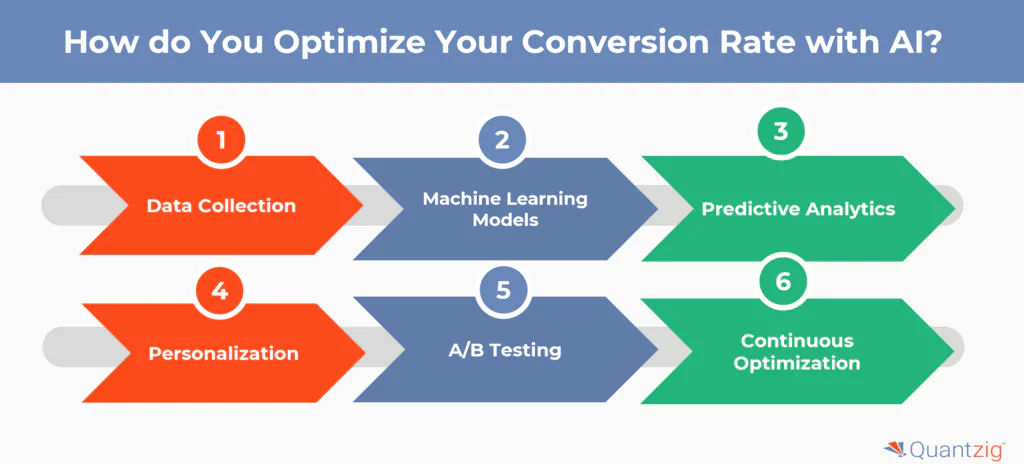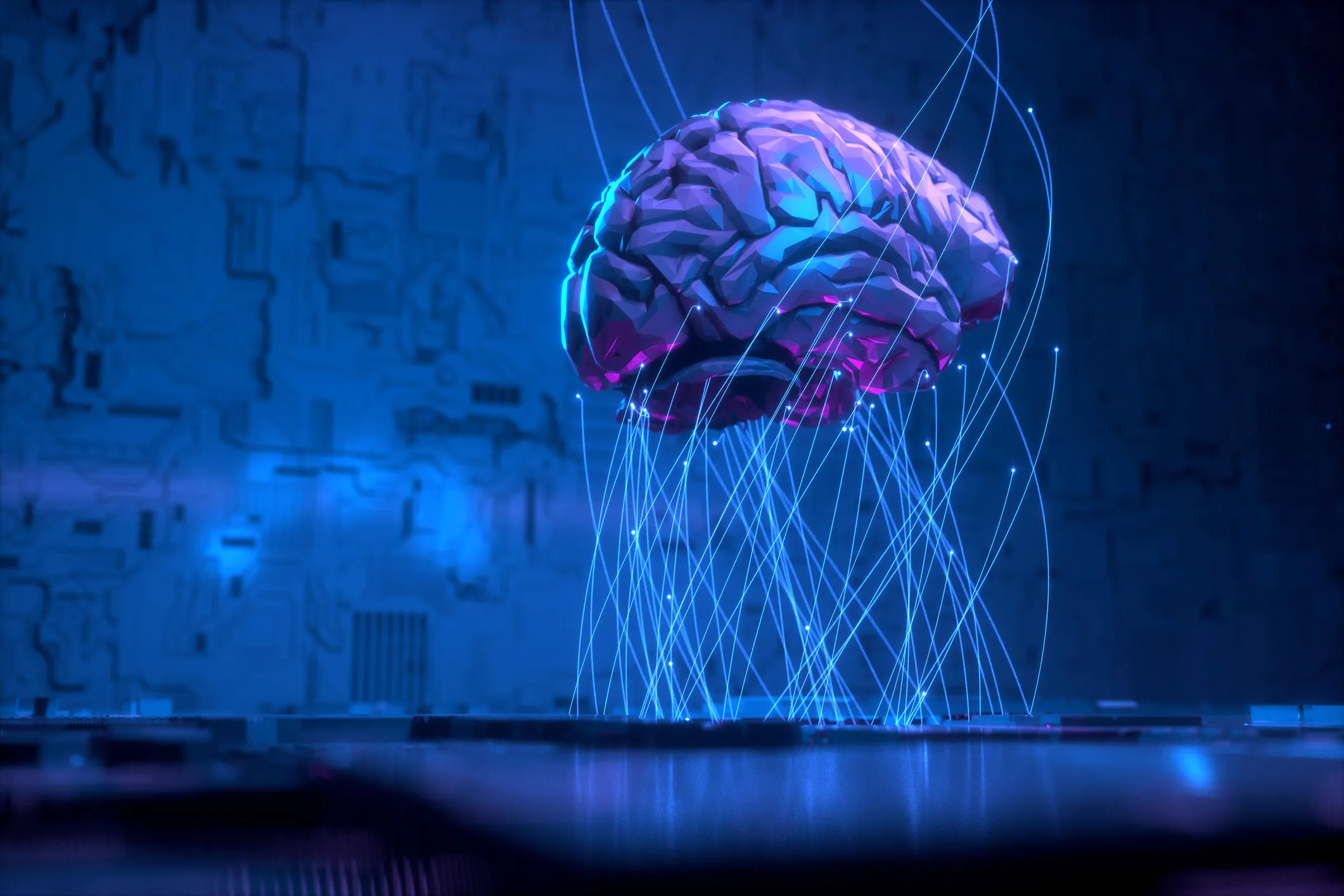In the fiercely competitive digital marketing arena, Artificial Intelligence (AI) emerges as a pivotal factor in enhancing conversion rates and driving business success. From intelligent chatbots that engage customers to predictive analytics pinpointing the most promising leads, AI is reshaping how businesses interact with and convert their online audience. This article delves into the multifaceted impact of AI conversion rate optimization, exploring how it can elevate your business to new levels of efficiency and profitability.
Book a demo to experience the meaningful insights we derive from data through our analytical tools and platform capabilities. Schedule a demo today!
Book a demo to experience the meaningful insights we derive from data through our analytical tools and platform capabilities. Schedule a demo today!
Request a DemoTable of Contents
What is Conversion Rate Optimization?
Conversion Rate Optimization (CRO) is a strategic process that aims to improve the percentage of website visitors who complete a desired action, such as filling out a contact form, subscribing to a newsletter, or making a purchase. By analyzing and optimizing various elements of a website, including user experience, content, and design, CRO helps businesses increase conversions and drive revenue. This data-driven approach involves testing and refining different elements, such as calls-to-action, forms, and checkout processes, to ensure that the website is optimized for maximum conversions. By leveraging CRO, businesses can enhance customer engagement, improve return on investment (ROI), and ultimately drive business growth and success

How can AI Impact Your Conversion Rates?

Artificial Intelligence (AI) significantly impacts Conversion Rate Optimization (CRO) by enhancing various aspects of digital marketing through predictive analytics and AI writing tools. Platforms like Evolv AI can optimize SEO (Search Engine Optimization) and PPC Advertising (Pay-Per-Click Advertising) campaigns, boosting marketing ROI. By leveraging Google Analytics and multivariate testing, AI helps in refining landing page optimization and conducting effective user testing. This, in turn, improves AI conversion rate optimization strategies, leading to higher customer lifetime value and better overall performance in digital campaigns.
1. Personalized Recommendations:
AI-driven personalization tailors the customer experience by analyzing extensive data, including purchasing history, browsing behavior, demographic details, and social interactions. This approach allows businesses to offer uniquely personalized experiences, significantly enhancing the likelihood of conversions. An exemplar of this is Starbucks, whose AI-based personalization system has increased customer loyalty and purchase frequency for e commerce and ecommerce conversion.
2. Intelligent Chatbots:
AI-powered chatbots, designed to simulate human conversations, provide instant, personalized customer support and customer journey. This innovation not only eliminates long wait times but also ensures prompt, relevant responses, thereby enhancing customer experience and boosting conversion rates and ai conversion optimization. For instance, Foyer, a global wealth management and insurance firm, experienced improved customer response times with Chatlayer’s AI bot, which supported customer requests in about 125 languages.
3. Predictive Analysis:
Leveraging machine learning, predictive analytics forecast future customer behaviors and trends, allowing businesses to provide proactive support and tailored solutions. This data-driven approach captures customer attention more effectively, leading to increased conversions.
4. Intelligent Ad Targeting:
AI-powered ad targeting allows marketers to deliver highly targeted ads at the right moment. Through A/B testing of various ad elements, AI helps in identifying the most effective messaging and formats, thereby improving ad performance and conversion rates.
5. Dynamic Pricing Strategies:
AI algorithms analyze customer behavior, competitor pricing, and real-time market data to optimize pricing strategies. This capability enables businesses to respond quickly to market changes with competitive pricing that attracts customers and maximizes profitability.

How do You Optimize Your Conversion Rate with AI?

Optimizing conversion rates with AI involves using machine learning algorithms to enhance various aspects of a website, including user experience, content, and design. This process begins with data collection, where information on user behaviorsuch as clicks, scrolls, and interactionsis gathered to gain insights into how visitors engage with the site.
Next, machine learning models are trained to analyze this data, uncovering patterns and trends that can guide optimization strategies. Through predictive analytics, AI can forecast the likelihood of users completing desired actions, such as making a purchase or submitting a form. Another crucial aspect is personalization. AI enables businesses to tailor content, offers, and messaging to individual users based on their behavior and preferences, creating a more relevant and engaging experience. Additionally, AI-driven A/B testing can automate the comparison of different webpage versions, helping to identify which designs or content variations perform better.
Finally, continuous optimization is key. AI tools allow for ongoing monitoring and refinement of website elements, ensuring sustained improvement in conversion rates and a consistently high-quality user experience.
By leveraging AI conversion rate optimization techniques in these ways, businesses can more effectively drive conversions, resulting in increased revenue and greater customer satisfaction.
How to Calculate Conversion Rate?
To calculate conversion rate, you can use the following formula:
Conversion Rate = (Number of Conversions / Total Number of Visitors) * 100For example, if a website had 500 visitors and 50 of them completed the desired action (e.g., making a purchase or filling out a form), the conversion rate would be:
Conversion Rate = (50 / 500) * 100 = 10%
Key Ingredients to a Solid AI CRO Process
- Data Collection: Collect data on user behavior, such as clicks, scrolls, and interactions, to understand how users engage with your website.
- Machine Learning Algorithms: Utilize machine learning algorithms to analyze the collected data and identify patterns and trends that can inform conversion optimization decisions.
- Predictive Analytics: Use predictive analytics to forecast the likelihood of a user completing a desired action, such as making a purchase or filling out a form.
- Personalization: Use AI to personalize the user experience by tailoring content, offers, and messaging to individual users based on their behavior and preferences.
- A/B Testing: Use AI to automate A/B testing, which involves comparing the performance of different versions of a webpage or element to determine which one performs better.
- Continuous Optimization: Continuously monitor and optimize the website based on the insights provided by AI, ensuring that the conversion rate remains high, and the user experience remains engaging.
How can AI CRO Boost Your Business?
Implementing AI conversion rate optimization can offer a range of benefits that significantly enhance your business performance. One of the most impactful advantages is increased conversions, as AI can identify and optimize the most effective elements of your website to encourage users to take desired actions.
AI CRO also contributes to an improved user experience by delivering personalized content and offers tailored to individual preferences. This level of customization not only engages users more effectively but also builds stronger customer relationships.
In addition, AI provides enhanced data insights by analyzing user behavior and preferences. These insights support smarter, data-driven decisions that lead to better optimization strategies. By leveraging advanced analytics and machine learning, businesses can gain a competitive advantage, staying ahead in their industry with continuously optimized digital experiences.
Ultimately, all these factors contribute to increased revenue, as a more optimized and user-friendly website drives more conversions and higher customer satisfaction. By incorporating AI conversion rate optimization into your digital marketing strategy, you can unlock the full potential of your website and fuel Sustainable business growth.
Conclusion: The Transformative Power of AI in Conversion Rate Optimisation
In the era of digital transformation, AI stands as a formidable ally for businesses aiming to enhance their conversion rates. Integrating AI into digital strategies unfolds a myriad of possibilities:
- Intelligent Chatbots and Personalization: AI-driven solutions like chatbots provide a personalized and engaging users engagement experience, fostering trust and loyalty. This personal touch in digital interactions significantly boosts conversion rates.
- Predictive Analytics for Proactive Engagement: AI’s predictive capabilities allow businesses to anticipate and meet the evolving needs of customers. This foresight leads to more effective, targeted marketing strategies and higher conversion rates for better marketing campaigns.
- Dynamic Pricing for Market Responsiveness: AI’s dynamic pricing strategies help businesses stay competitive and appealing to customers, adapting prices in real-time to match market trends and consumer behavior.
- Enhanced Ad Targeting: AI’s advanced ad targeting techniques ensure that marketing efforts are not just widespread but sharply focused on potential customers most likely to convert, maximizing the effectiveness of advertising campaigns.
In summary, AI is not just a tool but a game-changer in conversion rate optimization. By evaluating customer behavior, delivering tailored experiences, and adapting to market dynamics, AI algorithms empower businesses to reach new heights in customer engagement and conversion rates. Embracing AI in digital strategies ensures that businesses not only keep up with the competition but set new benchmarks in customer conversion success, including effective website optimization techniques and conversion tracking and website performance to enhance website conversion and visitors.
Also Read: Understanding Omnichannel Marketing Analytics for Businesses
Get started with your complimentary trial today and delve into our platform without any obligations. Explore our wide range of customized, consumption driven analytical solutions services built across the analytical maturity levels.
Start your Free Trial Today



